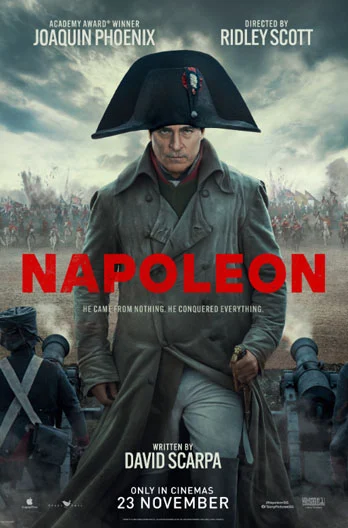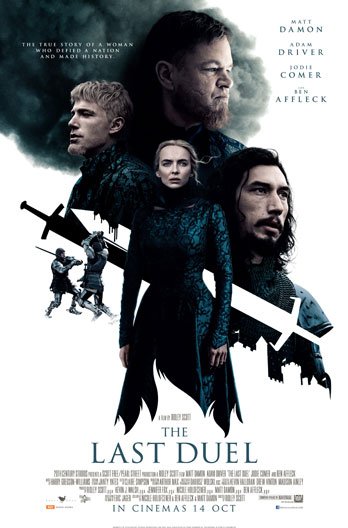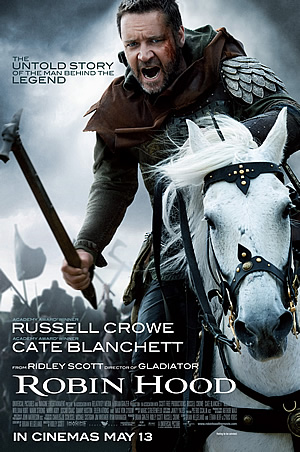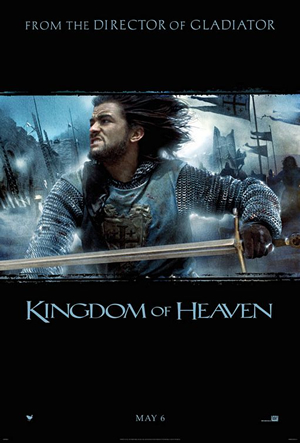NAPOLEON (2023)
Genre: Action/War
Director: Ridley Scott
Cast: Joaquin Phoenix, Vanessa Kirby, Ben Miles, Tahar Rahim, Ludivine Sagnier, Ian McNeice
Runtime: 2 hrs 38 mins
Rating: M18 (Sexual Scenes & Violence)
Released By:
Official Website:
Opening Day: 23 December 2023
Synopsis: "Napoleon" is a spectacle-filled action epic that details the checkered rise and fall of the iconic French Emperor Napoleon Bonaparte, played by Oscar winner Joaquin Phoenix. Against a stunning backdrop of large-scale filmmaking orchestrated by legendary director Ridley Scott, the film captures Bonaparte's relentless journey to power through the prism of his addictive, volatile relationship with his one true love, Josephine, showcasing his visionary military and political tactics against some of the most dynamic practical battle sequences ever filmed.
Movie Review:
How do you tell the tale of the legendary military leader and French emperor Napoleon Bonaporte in a feature film? That is the very fundamental challenge confronting Sir Ridley Scott, who despite his best efforts, stumbles at wrangling a coherent, let alone compelling, portrait of his subject within two and a half hours. Sure, it has the sweep and swagger of Scott’s historical epics (think ‘Gladiator’ or ‘Kingdom of Heaven’), but anyone hoping for a better understanding of what drove him or what he was really like will likely be disappointed.
Notwithstanding the intertitles establishing Napoleon as a Corsican gunner when we first meet him, as well as to mark the pivotal battles of his storied legacy, you’d do well to at least have a basic understanding of his fortunes and fates. That includes the Siege of Toulon, his defeat of the royalist insurrection at Tuileries Palace (a la ‘13 Vendémiaire), his Egyptian expedition, the coup d’etat he engineered that led to his appointment as first consul, his coronation as emperor, the Battle of Austerlitz, the invasion of Russia, the wars of the Sixth and Seventh Coalition, and last but not least his exile to St Helena where he died at the age of 51.
It is a lot of ground to cover (pun not intended), which probably explains why there is a four-hour cut that will be streamed on AppleTV+ sometime next year; as this theatrical cut stands though, there is too little said and too much left unexplained, especially in the last act. Oh yes, the events leading up to Napoleon’s invasion of Russia are given short shrift, so too the Battle at Borodino that led to the occupation of Moscow and the subsequent deteoriation of the Grande Armee; the same can also be said of Napoleon’s return to Paris during the Congress of Vienna, and the culmination of the war that led to the Battle at Waterloo.
Priority has obviously been given to his battles to justify the big-screen experience, and to his credit, Scott stages each of these with pomp and pageantry. Balancing between the intimate and the expansive, Scott pays faultless attention to strategic detail and loss to both human and equine life. The carnage is as well-choreographed as you have ever seen from Scott, though we wish that Scott had paused from time to time to also illuminate Napoleon’s military genius, and in particular his battlefield strategy which has been studied by many generations of historians for both its brilliance and follies.
The need to trim to a theatrically friendly runtime also diminishes the emotional heft of the relationship between Napoleon and Josephine (Vanessa Kirby), which was intended as the backbone of the story. Despite a first hour meticulously building up the cockeyed romance between them, the next hour and so hardly does the complexities of their marriage and subsequent dissolution justice; in particular, we wish that the movie had given greater poignancy to how Napoleon had decided to annul their marriage after it was clear Josephine would not be able to bear him a heir, as well as how he had continued to love her even after marrying Marie Louise of Austria.
Much has been said of Phoenix’s portrayal of Napoleon, but it would do well to first recognise that Scott’s intention is to expose the hollowness of his subject’s lust for power, and in fact to treat this Corsican outsider’s ascent into the upper echelons of French politics as a spectacularly bad joke. It is why he has Phoenix throw out such lines as ‘destiny has brought me to this lamb chop!’ when Napoleon is accused by Josephine of being fat, or whine to the English ‘you think you’re so great just because you have boats’ when negotiating with them. Oh yes, Scott intends to puncture his subject’s mystique, and in this respect, his casting of Phoenix is entirely intentional to turn Napoleon into a subject of his own absurdist comedy.
We can’t say if we would have enjoyed it more if Scott had chosen someone like Russell Crowe to play the role with the right commanding temperament, but to what Scott had intended to accomplish, we can say that Phoenix’s sly, intentionally self-absorbed portrayal is funny and well-played. Thankfully, Kirby too is in on the joke, casting a mesmerising spell as the glittering-eyed widow who is all too familiar with the sadomasochistic desire and overweening ego which Napoleon embodies. Theirs is a perfect one-two complement, not in the way that some would have expected certainly, but definitely in what Scott had intended.
To Scott’s credit therefore, ‘Napoleon’ isn’t intended as a hagiography of its subject, but a deconstruction of his intense desire for dominion, conquest and a permanent place in history, whether on the battlefield or in the bedroom. Yet that vision is somewhat lost amidst both narrative and storytelling disjoints in this condensed theatrical edit, which emphasises spectacle over both character- and world-building. It is certainly still a fine piece of filmmaking as a grim and grimy sword-and-scandals epic, but there is little more you will learn or take away about the man (or for that matter, woman) at its centre.
Movie Rating:




(Ridley Scott’s eye for spectacle is just as breath-taking, but in all other respects, this biography lacks a coherent and compelling portrait of the man at its centre)
Review by Gabriel Chong
You might also like:





